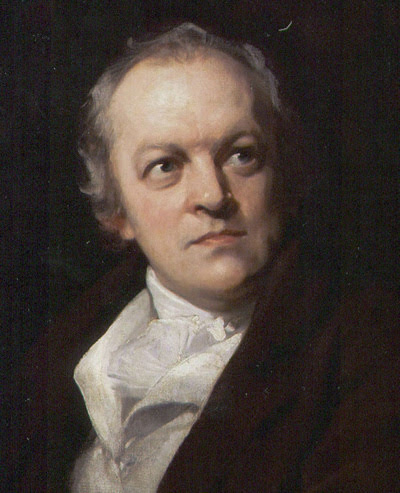William Blake

28 November: WB is born in London. His father is James Blake, a hosier, who can barely afford to send WB to school. WB has fantastic visions, including seeing God, and angels in a tree. He would later claim that he had regular conversations with his deceased brother, Robert. It was soon apparent that WB's internal world of imagination would be a prime motivator throughout his life.
Sent to Henry Par`s drawing school in the Strand.
Becomes an apprentice of Basire the engraver.
Becomes a professional engraver.
18 August: Marries Catherine Boucher, the daughter of a Battersea market-gardener.
Publishes his first volume of poetry, Poetical Sketches
Begins to experiment with a method of printing from etched copper plates, a method he received in a dream. Although WB invents this process, and is a great engraver, he does not have a head for business. Throughout his professional life he turns down offers from publishers in order to work on his own material, which sells slowly, if at all.
1 January: Publishes All Religions are One
Publishes There is No Natural Religion
Publishes Songs of Innocence. Catherine colors the plates and binds the books.
Publishes The Book of Thel (1789-1790)
Publishes The Marriage of Heaven and Hell
Begins to focus on longer poems, like "Visions of the Daughters of Albion" (1793), Europe, A Prophecy (1794), and then long poetic epics like Milton (1804-08), Vala, or The Four Zoas (1797; rewritten after 1800), and Jerusalem (1804-20), which have neither traditional plot, characters, rhyme, nor meter. They envision a new and higher kind of innocence, the human spirit triumphant over reason.
Moves to Felpham, a seacoast town. Gets his first real patron, William Hayley, who commissions WB to illustrate his Life of Cowper, and to create busts of famous poets for his house.
Charged and tried for high treason; found innocent
Has an exhibit of his watercolors at the Royal Academy. While his work is praised by many, others think him insane.
Meets John Linnell, a younger artist who helps him financially. Many younger artists admire Blake's work, while many poets -- like Wordsworth and Southey -- believe him to be insane.
27 August: WB dies; is buried in an unmarked grave in the Non-Conformist Bunhill Fields in London, where Catherine is buried four years later (among other notable figures of dissent like Daniel Defoe and John Bunyan). In 1957 a memorial to Blake and his wife was erected in Poet's Corner of Westminster Abbey, London.
And a Heaven in a Wild Flower,
Hold Infinity in the palm of your hand
And Eternity in an hour.